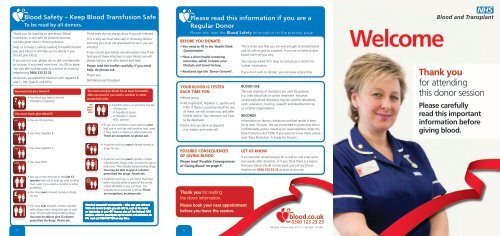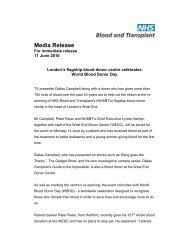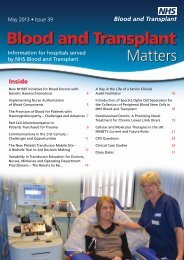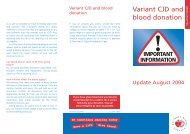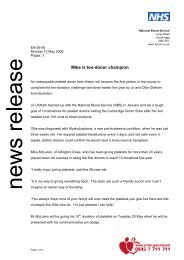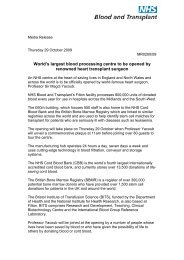22418 Donor Welcome booklet - National Blood Service
22418 Donor Welcome booklet - National Blood Service
22418 Donor Welcome booklet - National Blood Service
You also want an ePaper? Increase the reach of your titles
YUMPU automatically turns print PDFs into web optimized ePapers that Google loves.
Thank you for wanting to give blood. <strong>Blood</strong><br />
transfusion is very safe for patients because<br />
we take great care in choosing donors.<br />
Help us to keep it safe by reading this leaflet before<br />
you give blood. It will help you to decide if you<br />
should give blood.<br />
If you are not sure, please ask to talk confidentially<br />
to a nurse. If you need more time, it is OK to leave.<br />
You can talk confidentially to a doctor or nurse by<br />
telephoning 0300 123 23 23.<br />
All donors are tested for infection with hepatitis B<br />
and C, HIV, Syphilis and HTLV.<br />
HIV<br />
Hep B<br />
<strong>Blood</strong> Safety – Keep <strong>Blood</strong> Transfusion Safe<br />
To be read by all donors.<br />
You must not give blood if:<br />
• You think you need a test for<br />
HIV/AIDS or hepatitis.<br />
You must never give blood if:<br />
• You are HIV positive.<br />
• You have hepatitis B.<br />
These tests do not always show if you are infected.<br />
This is why we must take care in choosing donors<br />
and why you must not give blood to see if you are<br />
infected.<br />
If you cannot give blood, we will explain why. If we<br />
find any of these infections in your blood, we will<br />
always tell you and offer advice and help.<br />
Please read this leaflet carefully, if you need<br />
help, do please ask.<br />
Thank you.<br />
NHS <strong>Blood</strong> and Transplant<br />
You must not give blood for at least 12 months<br />
after sex (even if you used a condom or other<br />
protective) with:<br />
HIV<br />
Hep B<br />
Hep C<br />
HTLV<br />
• A partner who is, or you think may be:<br />
- HIV positive.<br />
- A hepatitis B carrier.<br />
- A hepatitis C carrier.<br />
- HTLV positive.<br />
• (If you are a woman) a man who has ever<br />
had oral or anal sex with another man, even<br />
if they used a condom or other protective.<br />
There are exceptions so please ask.<br />
Please read this information if you are a<br />
Regular <strong>Donor</strong><br />
Please also read the <strong>Blood</strong> Safety information on the previous page.<br />
BEFORE YOU DONATE:<br />
• You need to fill in the ‘Health Check<br />
Questionnaire’.<br />
• Have a short health screening<br />
interview, which includes your<br />
lifestyle and travel history.<br />
• Read and sign the ‘<strong>Donor</strong> Consent’.<br />
YOUR BLOOD IS TESTED<br />
EACH TIME FOR:<br />
• <strong>Blood</strong> group.<br />
• HIV, hepatitis B, hepatitis C, syphilis and<br />
HTLV. If there is a positive result for any<br />
of these, we will contact you and offer<br />
further advice. Your donation will have<br />
to be destroyed.<br />
• Extra tests are done as required<br />
e.g. malaria and sickle cell.<br />
This is to be sure that you are well enough to donate blood<br />
and it’s safe to give to a patient. If you are not able to give<br />
blood, we’ll tell you why.<br />
You may be asked if it’s okay to contact your doctor for<br />
further information.<br />
If you don’t wish to donate, you can leave at any time.<br />
BLOOD USE<br />
The vast majority of donations are used for patients<br />
e.g. after blood loss or cancer treatment. However,<br />
occasionally blood donations may be used for laboratory<br />
work, education, training, research and development by<br />
us or other organisations.<br />
RECORDS<br />
Information on donors, donations and test results is kept<br />
for at least 30 years. We are committed to protecting donor<br />
confidentiality and to meeting our responsi bilities under the<br />
Data Protection Act 1998. If you want to know more, please<br />
read ‘Data Protection: A Guide for <strong>Donor</strong>s.’<br />
<strong>Welcome</strong><br />
Thank you<br />
for attending<br />
this donor session<br />
Please carefully<br />
read this important<br />
information before<br />
giving blood.<br />
Hep C<br />
HTLV<br />
• You have hepatitis C.<br />
• You have HTLV.<br />
• You are a man who has in the last 12<br />
months had oral or anal sex with another<br />
man, even if you used a condom or other<br />
protective.<br />
• You have ever received money or drugs<br />
for sex.<br />
• A partner who has ever received money or<br />
drugs for sex.<br />
• A partner who has ever injected, or been<br />
injected with, drugs; even a long time ago or<br />
only once. This includes body-building drugs.<br />
You may be able to give if a doctor<br />
prescribed the drugs. Please ask.<br />
• A partner who has, or you think may have<br />
been, sexually active in parts of the world<br />
where HIV/AIDS is very common. This<br />
includes most countries in Africa. There<br />
are exceptions, so please ask.<br />
POSSIBLE CONSEQUENCES<br />
OF GIVING BLOOD<br />
Please read ‘Possible Consequences<br />
of Giving <strong>Blood</strong>’ on page 3.<br />
Thank you for reading<br />
the donor information.<br />
LET US KNOW<br />
If you become unwell (except for a cold or cold sore) up to<br />
two weeks after donation, or if you think there is a reason<br />
that your blood should not be used, just call our <strong>Donor</strong><br />
Helpline on 0300 123 23 23 as soon as you can.<br />
• You have ever injected, or been injected<br />
with, drugs; even a long time ago or only<br />
once. This includes body-building drugs.<br />
You may be able to give if a doctor<br />
prescribed the drugs. Please ask.<br />
Worried about HIV or Hepatitis – Who can you talk to<br />
There are several people you can talk to, such as the nurse<br />
on duty today or your GP. You can also call the <strong>National</strong> AIDS<br />
Helpline, which is specially set up for advice and assistance on<br />
HIV. Just call 0800 567123 at any time.<br />
5 6<br />
Please book your next appointment<br />
before you leave the session.<br />
blood.co.uk<br />
0300 123 23 23<br />
INF234/3 Effective Date: 07.11.11 BLC655P 1112432
Please read this information if you are a New <strong>Donor</strong> or returning after a break<br />
THE DONATION PROCESS<br />
OTHER INFORMATION<br />
YOUR INFORMATION<br />
FEELING FAINT<br />
Some donors may feel faint as a consequence of giving<br />
blood and a small number will actually faint. There are<br />
a variety of reasons for this and there are things that<br />
you and our staff can do to help reduce the risk of this<br />
happening to you, so please follow the advice given to<br />
you on session and if you are at all concerned about<br />
feeling faint or fainting then please ask to speak to the<br />
nurse in charge. Our staff are trained to care for you if<br />
you do feel faint and will make sure you do not leave<br />
the session until you are feeling well. After donation,<br />
please drink plenty of nonalcoholic fluid, avoid<br />
strenuous exercise, or heat e.g. saunas. Also avoid any<br />
activity that may be hazardous to you or others should<br />
you start to feel weak or light headed. If you do feel<br />
faint after leaving the session, lie down straight away<br />
and drink plenty of fluid. If your symptoms persist or you<br />
actually faint seek advice from NHSBT or NHS Direct.<br />
LET US KNOW<br />
REGISTRATION<br />
When you volunteer to give blood you will need<br />
to register your details (name, address and date of<br />
birth) on our computerised database. This is used by<br />
us to communicate with you and to print out your<br />
donation record. If you have spoken to our <strong>Donor</strong><br />
Helpline we may already hold your details, so you<br />
will be asked to confirm them.<br />
We will ask you to drink 500mls of water<br />
while you are waiting to donate. It has been<br />
shown that this can reduce the incidence of<br />
feeling faint.<br />
HEALTH SCREENING<br />
Each time you donate you are asked to fill in a<br />
‘Health Check Questionnaire’ which asks about your<br />
medical history, lifestyle and travel history. You will<br />
then have a health screening interview. This is to be<br />
sure that you are well enough to donate blood and<br />
it’s safe to give to a patient. The interview will be<br />
conducted in as much privacy as the setting allows.<br />
DONOR CONSENT<br />
Next you will need to carefully read and sign the<br />
‘<strong>Donor</strong> Consent’. This is a legal requirement and<br />
shows we are sure you understand what is involved<br />
in blood donation before you donate. If you are not<br />
able to give blood, we will tell you the reasons. You<br />
may be asked if it’s okay to contact your doctor for<br />
further information.<br />
If you have any questions about donating, please<br />
ask a member of staff. If you don’t wish to donate<br />
you can leave at any time.<br />
HAEMOGLOBIN TESTING<br />
We test a small drop of blood taken from your finger,<br />
to make sure you are not anaemic. If the test shows<br />
that you may be, a blood sample is taken from your<br />
arm for an additional test. If all is okay, you may be<br />
able to give blood straight away. If your level is below<br />
normal we will write and advise you what to do next.<br />
DONATION<br />
You need to lie down on a donation bed or chair<br />
where we’ll check your details. A pressure cuff<br />
will then be put around your upper arm (to make<br />
the vein more visible) and the donation area will<br />
be cleaned with antiseptic. A needle attached to<br />
a blood bag, will then be inserted. During your<br />
donation it is best to open and close your hand. This<br />
helps the blood flow smoothly.<br />
Our staff will keep a close eye on you and the bag<br />
to make sure everything is fine. It usually takes<br />
five to ten minutes to complete your donation of<br />
470mls (just under a pint). At the same time blood<br />
samples are collected for testing. If there are any<br />
problems we may stop the donation early.<br />
After donation the needle will be carefully removed<br />
from your arm and a dressing applied. We will show<br />
you how to press on the site where the needle was.<br />
This is important in helping to prevent bruising.<br />
RESTING<br />
You will be advised to rest and make sure that<br />
you’re fully recovered before moving to the<br />
refreshment area. Here you will be offered a drink<br />
and a snack.<br />
AFTER YOU HAVE GIVEN BLOOD:<br />
• Make sure that you drink plenty of fluids after you<br />
leave the session.<br />
• Leave your plaster on at least six hours.<br />
• Take care of your arm by avoiding heavy lifting for<br />
the rest of the day.<br />
• Avoid activities which may present a hazard to you<br />
or others if you happened to start feeling weak or<br />
light headed.<br />
• If bleeding recurs, raise your arm and press on the<br />
donation site for at least five minutes.<br />
• If you feel faint, lie down immediately, rest until<br />
you feel better and drink plenty of fluid.<br />
TESTING BLOOD DONATIONS<br />
Your blood group is checked each time you donate.<br />
Every time it is also tested for HIV, hepatitis B,<br />
hepatitis C, syphilis and HTLV. If your donation gives<br />
a positive result for any of these tests you will be<br />
contacted and offered further advice. Your donation<br />
will have to be destroyed.<br />
Extra tests are carried out on some donations either<br />
because of information provided by you (e.g. travel<br />
history) or to meet the special needs of certain patients<br />
(e.g. babies). These tests include malaria testing, sickle<br />
cell and more detailed blood grouping. More information<br />
can be found in our leaflet ‘Tests on your blood’.<br />
USING BLOOD<br />
The vast majority of donations are used for patients<br />
e.g. after blood loss or cancer treatment.<br />
We would like donors to know that their blood<br />
may also be used for purposes other than for direct<br />
transfusion to patients. As part of our commitment<br />
to a high quality service, we sometimes use<br />
donations for laboratory work, education, training,<br />
research and development and/or for use in the<br />
commercial preparation of healthcare related<br />
products, within NHSBT or by other organisations.<br />
An example of this is that we provide the plasma<br />
that becomes available as a by product of your<br />
donation for use in the commercial production of<br />
blood test reagents and biochemical assays, which<br />
are essential for effective patient care. This type of<br />
by product would otherwise have to be discarded<br />
at a significant cost to the NHS. Using it for this<br />
purpose allows us to reduce wastage and keep our<br />
costs down. If your donation is used for any of these<br />
purposes, NHSBT will ensure that:<br />
• ethical approval is obtained where appropriate<br />
• there are no implications for your health or welfare<br />
• you cannot be identified<br />
• any income received is used for the benefit of<br />
NHSBT.<br />
We keep records on donors, donations and test results<br />
for at least 30 years. All records, either computerised<br />
or paper are kept securely.<br />
WE USE THIS INFORMATION:<br />
• to communicate with you, like sending session<br />
invitations or information about other donation<br />
matters<br />
• to ensure the safety of donors and patients<br />
• for clinical audit to assess and improve our service<br />
• for research, to improve our knowledge about the<br />
donor population<br />
• for management and administration.<br />
To stay in touch, we may compare details with central<br />
NHS records or those of other data processors.<br />
We are committed to protecting the confidentiality of<br />
donors and to meeting our responsibilities under the Data<br />
Protection Act 1998. You can find out more, by reading<br />
our ‘Data Protection – A Guide for <strong>Donor</strong>s’ leaflet.<br />
POSSIBLE CONSEQUENCES OF<br />
GIVING BLOOD<br />
For the vast majority of people, giving blood is a<br />
simple and trouble-free experience, but there are some<br />
expected consequences which you should be aware of:<br />
BRUISES<br />
Sometimes bruising of the arm develops, this is<br />
usually harmless and will fade within a few days.<br />
To help stop bruising, you should avoid heavy lifting or<br />
manual work with your donor arm for at least twelve<br />
hours after donation. Should you develop a bruise,<br />
application of a cold pack (following the manufacturers<br />
instructions or ice in a bag, as long as your skin is<br />
protected by a cloth) will help reduce the size of the<br />
bruise. Some donors experience pain in their donor<br />
arm following donation, this is not uncommon and<br />
after 24 hours you should use the arm normally. If the<br />
bruising, pain or discomfort become severe you should<br />
seek advice from the NHSBT helpline or NHS Direct.<br />
UNCOMMON RISKS<br />
Very infrequently, inserting the needle may cause<br />
inflammation of your arm, irritation of a nerve or<br />
puncture an artery. Our staff are trained to recognise<br />
these rare complications and you will be given<br />
immediate treatment and appropriate advice. If these<br />
occur after you leave the session you should contact<br />
NHSBT or NHS Direct for advice. If your problems<br />
persist then you should contact your GP.<br />
If you become unwell (except for a cold or coldsore)<br />
in the two weeks following your donation, or if you<br />
believe there is a reason that your blood should not<br />
be transfused to a patient, ring our <strong>Donor</strong> Helpline<br />
as soon as possible on 0300 123 23 23.<br />
Please also read the <strong>Blood</strong> Safety information on the<br />
page overleaf.<br />
blood.co.uk<br />
0300 123 23 23<br />
2 3 4


